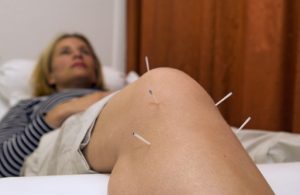
Researchers at the University of Melbourne randomly assigned 282 patients with chronic knee pain to needle acupuncture, laser acupuncture, no acupuncture, or sham laser treatment. Treatments were administered over the course of 12 weeks, and the study was double blind – neither patients nor doctors were aware whether it was laser or sham laser acupuncture administered.
Researcher Professor Kim Bennell stated there was no significant difference in the measurement of knee pain and physical function between active and sham acupuncture at 12 weeks or at one year. “Both needle and laser acupuncture resulted in modest improvements in pain, compared with the control group who had no treatment at 12 weeks. However, these results were not maintained at one year. Needle acupuncture improved physical function at 12 weeks, compared with the control, but was not different from sham acupuncture and was not maintained at one year,” Bennell explained.
No difference was noted in the quality of life either. Needle acupuncture did offer pain relief for 12 weeks, but the results were not maintained for a year.
Acupuncture and knee arthritis
Knee arthritis is a common occurrence for individuals over the age of 50, and acupuncture is an ancient technique that’s been around for centuries as a means to reduce pain. Acupuncture is an alternative form of treatment, which is rarely covered by insurance companies, and many doctors are still on the fence about its effectiveness. But those individuals who do find it effective continue to pay out of their pocket for this procedure.
Acupuncture is rarely used as a sole treatment method. It is often used to compliment other treatments. Acupuncture has been shown to improve knee pain in three ways:
- Boosting circulation to the injury site to promote healing
- Relaxing and loosening painful knots or trigger points
- Working with the body’s own healing and pain mediation process to resolve the underlying injury
Although evidence on acupuncture effectiveness is conflicting, it is something worth trying to see if you could benefit from it. Some doctors suggest trying it for a solid month and then making follow-ups to maintain results.
Related Reading:
Arthritis knee pain doesn’t improve with vitamin D
A new study has found that vitamin D supplements do not reduce pain or slow down the progression of arthritis in the knee even in patients with low levels of vitamin D. There is currently no treatment to stop the cartilage breakdown, which is common in osteoarthritis, and over time many patients undergo knee replacement surgery. Continue reading…
Crepitus knee pain and arthritis
Crepitus, although typically harmless, can be a sign of arthritis. Crepitus is a condition characterized by the popping, cracking or grinding of the joints in the body. It is most common in joint or knee cracking. It can even be used to describe the crackling in the lungs when someone has pneumonia. Continue reading..
Sources:
http://newsroom.melbourne.edu/news/study-finds-acupuncture-does-not-improve-chronic-knee-pain-0
http://jama.jamanetwork.com/article.aspx?articleid=1910110
http://www.health.harvard.edu/blog/acupuncture-knee-arthritis-fails-one-test-may-still-worth-try-201410017470